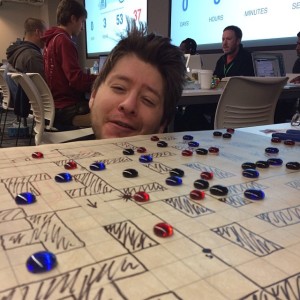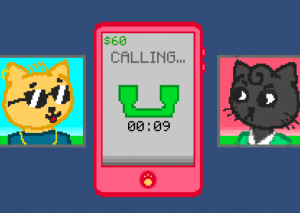 “Organizing a game jam follows roughly the same energy curve as participating in one,” a friend observed. First you’re really excited at the prospect of organizing, then just before it kicks off there’s an incredible amount of stress and you can’t see how this will possibly work. You wonder what you were thinking. Then by the closing ceremonies, you see how happy everyone is, see how much fun they had, and you can’t imagine why you were so stressed and upset. You can’t wait to do it again next year.
“Organizing a game jam follows roughly the same energy curve as participating in one,” a friend observed. First you’re really excited at the prospect of organizing, then just before it kicks off there’s an incredible amount of stress and you can’t see how this will possibly work. You wonder what you were thinking. Then by the closing ceremonies, you see how happy everyone is, see how much fun they had, and you can’t imagine why you were so stressed and upset. You can’t wait to do it again next year.
Last year, I attended the Global Game Jam at Facebook Headquarters. Aside from the unabashedly Orwellian decor—30ft posters of Sandberg quotes like “What would you do if you weren’t afraid?”—the experience was incredibly fun. The theme was fantastic; the games were great; Facebook did everything in their power to make sure we had as much soda, beer, and snacks as we wanted; and against all odds, my team made a game. It was undoubtedly my best jam yet, and I felt connected to games and the community in a real way.
But that was before August. Games are different now.
This year, I helped organize the jam at UC Santa Cruz. We’re known for being a school that makes progressive, weird games, and we wanted to embrace that. We invited UCSC’s own 4-time IGF-nominated Squinky to give our annual pre-jam talk, and they did a fantastic job. The organizers focused considerable effort on outreach to invite non-traditional creators in addition to our usual crop of talented undergrads. We invited people who don’t call themselves gamers.
And yet I couldn’t shake an apprehension that this year was going to be different. Gamergate changed everything. It refuses to end. All of that hate, the misogyny that I felt with old gaming groups, is out in the open now. What if the people who show up are the harassers at the other end of the screen? I felt like Felicia Day. It made me sad, and it made me scared. The pit in my stomach grew as more and more people poured into our opening ceremony.
After the keynote, the theme announcement video—always the most anticipated part of the opening—started up to cheers and applause. It teased the audience, as if asking repeatedly “Are you ready to know the theme? Are you? Are you sure?” The crowd laughed in unison at each taunting delay. I smiled at their laughter.
Then the theme was announced:
What do we do now?
I was floored. The theme committee knew. They got it. What do we do now—as an industry? As a community? What are we supposed to do with this fractured, broken thing we call videogames? There was so much room with that theme for comedy, for tension release, for laughter, for hope. What do we do now?—we had 48 hours to figure that out.
“Now if you are wondering,” the video teased, “what does that mean? How do you make a game with that? Don’t ask us…because it’s up to you.”
Excited chitters went up around the room. Groups who arrived together were already brainstorming whether to fit the theme into mechanics or content. Others headed to the front of the room to start our Looking For Group session. “What does the theme mean to you?” the LFG session leaders asked. Groups naturally formed around the answer.
For me, jams induce the same roller-coaster of emotions that any creative project does, just at a much faster pace. They always start with manic excitement: this is going to be the best project ever! Then that falls into the immersive zen of work for hours straight, which inevitably always slowly declines to frustration and despair. Many teams give up there. My team last year almost gave up when we hit the low point.
But when you hit the low point, the only thing you can do is keep going. You have to do the work.
Bleary-eyed and exhausted, jammers worked deep into Saturday night. Most hunched wearily over their computers, scowling and squinting, but making progress.
And eventually they broke through.
The final sprint of any jam is overwhelmingly stressful. No matter what stage your project is in, there are always those last minute things that will absolutely ruin your game if they’re not there. Your animations aren’t shiny, there’s a game-breaking bug on level 3 and where even is that guy on your team that nobody has seen in an hour? Is he napping?? Now??
The whole thing is going to be ruined, but maybe you can fix it if you could only work faster. Dear God, work faster! Faster!
At some point near the final buzzer, you hit an inexplicable calm—the “fuck it” point. You don’t care about this anymore. This is the way the game is going out, and that’s just the way it is. The world can deal. You start imagining how you’ll defend your game from critics, but these rationalizations are really more for you.
A few minutes before the closing ceremonies, I walked around to some of the groups to herd them toward the auditorium. I came upon one group of young jammers, deep in an argument, passive-aggressive shots flying back and forth, but all furiously working to get their game saved and uploaded.
“We’re all heading toward the auditorium, so make sure your game is up,” I offered.
“Ok, just one more thing,” a young woman pleaded. “Just one more thing.”
“We’ll be there in a second, GOD!” another guy snapped.
People aren’t always nice under stress.
I stayed behind for the beginning of the closing remarks to clean up our jam space. After a relatively quick and painless cleanup, I made it to the auditorium just in time for a fantastic presentation of the game What Do We Do Meow? about cats in long distance relationships. These were young designers who had made something great; their game got energetic smiles and laughter from the crowd.
to clean up our jam space. After a relatively quick and painless cleanup, I made it to the auditorium just in time for a fantastic presentation of the game What Do We Do Meow? about cats in long distance relationships. These were young designers who had made something great; their game got energetic smiles and laughter from the crowd.
“No really,” the presenter insisted, beaming. “I wrote real dialogue before I translated it to meows. There’s actually a story!” More laughs.
Their presentation closed to thunderous applause. It was followed by my friend Allie Riggs and her partner Jason Wright presenting their game Hey…Buddy about not knowing what kind of handshake/high-five to greet friends with. More laughs. Great game.
We ended up with 27 games, the majority of which come from first-time jammers.
Every presentation concluded with enormous applause. First-time game creators, apologetic that their working game with great art had only one level with a simple puzzle, were greeted with cheers. I’m smiling again just thinking about it.
I feel silly for ever doubting these people. These are my people. We all love games.
So what do we do now?

